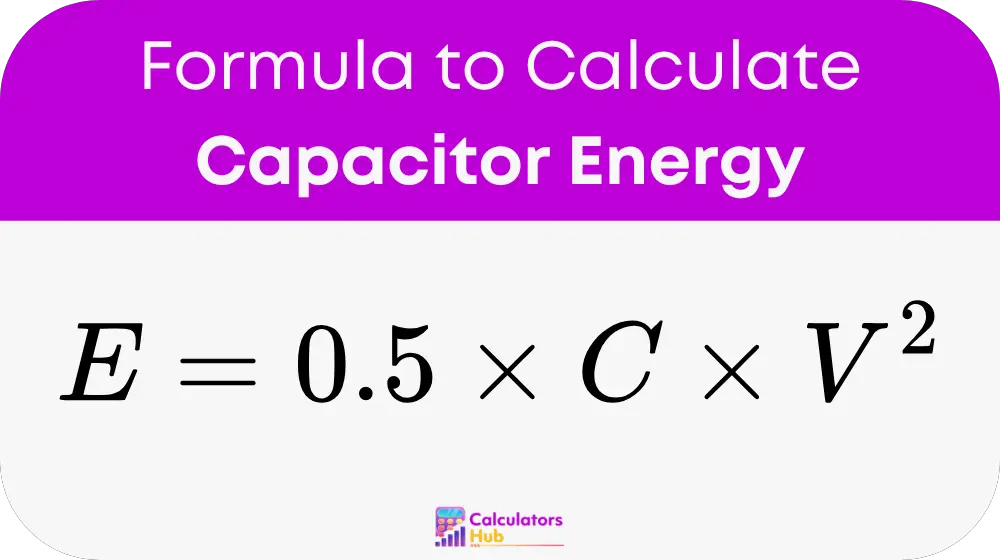A Capacitor Energy Calculator is a tool used to calculate the amount of energy stored in a capacitor. Capacitors are widely used in electrical and electronic circuits to store energy and release it when needed. The energy stored in a capacitor is dependent on the capacitance and the voltage across its terminals.
Understanding how much energy a capacitor can store is important in designing circuits that need temporary energy storage, like power supplies, flash circuits in cameras, or backup power systems. The calculator allows you to determine the exact energy in joules, which is a measure of the electrical energy stored in the capacitor.
Formula of Capacitor Energy Calculator
The formula to calculate the energy stored in a capacitor is:

Where:
- E is the energy stored in the capacitor in joules (J)
- C is the capacitance of the capacitor in farads (F)
- V is the voltage across the capacitor in volts (V)
How the Formula Works
- Capacitance (C): This measures a capacitor's ability to store charge. The larger the capacitance, the more charge a capacitor can hold, and hence more energy is stored.
- Voltage (V): The voltage across the capacitor plays a crucial role in determining the amount of energy. Since energy depends on the square of the voltage, even small increases in voltage result in significantly higher energy storage.
Why Is This Important?
Calculating the energy stored in a capacitor is essential for applications where you need to ensure that sufficient energy is available when required. For instance, in backup power systems or flash systems in cameras, the energy stored in a capacitor needs to be enough to power the system or provide a burst of energy. This calculator helps determine whether the capacitor you are using will meet those needs.
General Terms for Capacitor Energy Storage
Below is a helpful table showing common terms related to capacitor energy storage that people often search for:
| Term | Description |
|---|---|
| Capacitance (C) | The ability of a capacitor to store an electrical charge, measured in farads. |
| Voltage (V) | The potential difference across the capacitor's terminals, measured in volts. |
| Energy (E) | The electrical energy stored in the capacitor, measured in joules. |
| Power (P) | The rate of energy delivery, measured in watts. |
| Charge (Q) | The amount of electric charge stored in the capacitor, measured in coulombs. |
This table provides essential information, making it easier to understand and calculate capacitor energy without always needing to go through complex calculations.
Example of Capacitor Energy Calculator
Let’s consider an example to see how the energy stored in a capacitor is calculated:
Example:
- Capacitance (C) = 100 µF (100 x 10^-6 farads)
- Voltage (V) = 10 V
- Use the energy formula:E = 0.5 * C * V^2
- Substitute the values:E = 0.5 * 100 x 10^-6 F * (10 V)^2
- Simplify the calculation:E = 0.5 * 100 x 10^-6 F * 100 V^2E = 5 x 10^-3 joules, or 5 millijoules
So, the energy stored in the capacitor is 5 millijoules.
This is a relatively small amount of energy, which would be typical for small applications such as power stabilization in low-power electronic circuits.
Most Common FAQs
The energy stored in a capacitor depends on the square of the voltage. This means that increasing the voltage across a capacitor significantly increases the energy stored. For example, doubling the voltage will result in four times the energy stored in the capacitor.
The right capacitance value depends on your specific application. For applications requiring high energy storage, such as flash circuits or power backups, you will need capacitors with high capacitance values. On the other hand, low-capacitance values are suitable for filtering and signal smoothing.
Knowing the energy stored in a capacitor allows you to determine if the capacitor can meet the energy demands of your circuit or system. For example, in a power supply circuit, the energy stored in capacitors ensures a smooth supply of power during voltage drops or temporary interruptions.